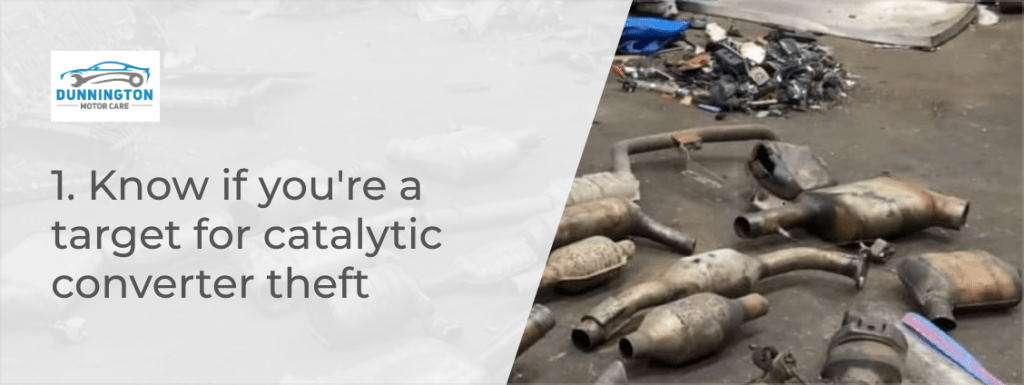To read our newsletter simply click the button below to view it as a PDF
A stolen catalytic converter replacement can cost as much as £2,500 for the often-targeted Toyota Prius.
Catalytic converter theft is on the rise nationwide. Thieves can steal this anti pollution device in a matter of minutes and sell it to scrap metal dealers for several hundred pounds for the precious metals it contains.
Such a theft is a crime of opportunity, with thieves often patrolling in the early hours of the morning in search of hybrid and electric vehicles.
There are however anti theft devices and methods available that would either deter or prevent such thefts from taking place.
Here are the top tips from our mechanics and North Yorkshire Police to avoid a wrenching experience and a costly repair.
Contact your local police division or trusted local garage ask what cars have been targeted in your area.
Vans and SUVs are often hit by thieves because it’s easy to slide under the vehicle rather than jack it up. Sometimes thieves unbolt the catalytic converter, but more often they just cut the connecting pipes using a battery-operated saw.
Thieves also usually operate in groups of two or three, and will be in possession of equipment such as a car jack.
Here are a few of the popular devices:
Some garages will custom-weld such a device to your car, we wish to attach caution to this option as attaching the catalytic converter directly to the car’s frame can be noisy since the exhaust system otherwise is suspended from the car by sound-buffering hangers.
Some sources recommend using a high-temperature fluorescent orange paint, such as those sprayed on barbecue grills, on your catalytic converter and then inscribing your vehicle identification number in the painted surface. This makes it traceable, and in theory at least, a reputable scrap metal dealer might decline to buy it.
You can turn up the sensitivity of your car alarm so that it goes off when thieves jostle your car. That’s fine, but can cause issues for neighbours as the alarm may blare when, for example, a cat jumps on the car in the middle of the night.
Other alarms are designed to be activated when the car is tilted, such as when it’s jacked up. Installing a motion-sensitive dash cam can notify you of a theft in progress or possibly record the license plate of the getaway car.
In addition to alarms, North Yorkshire Police recommend getting motion-sensitive lights and parking in your driveway or a closed garage whenever possible. They also suggest getting to know your neighbors so you can recognise strangers who might be casing parked vehicles.
Other devices such as Ring Doorbells are inexpensive and effective at deterring thieves.
Comprehensive insurance covers stolen auto parts.
If you carry liability coverage only, you’re not covered for theft.
If you come out in the morning and start your car, you’ll know by the loud exhaust noise that your catalytic converter was stolen. Here are a few steps that can get you going again:



